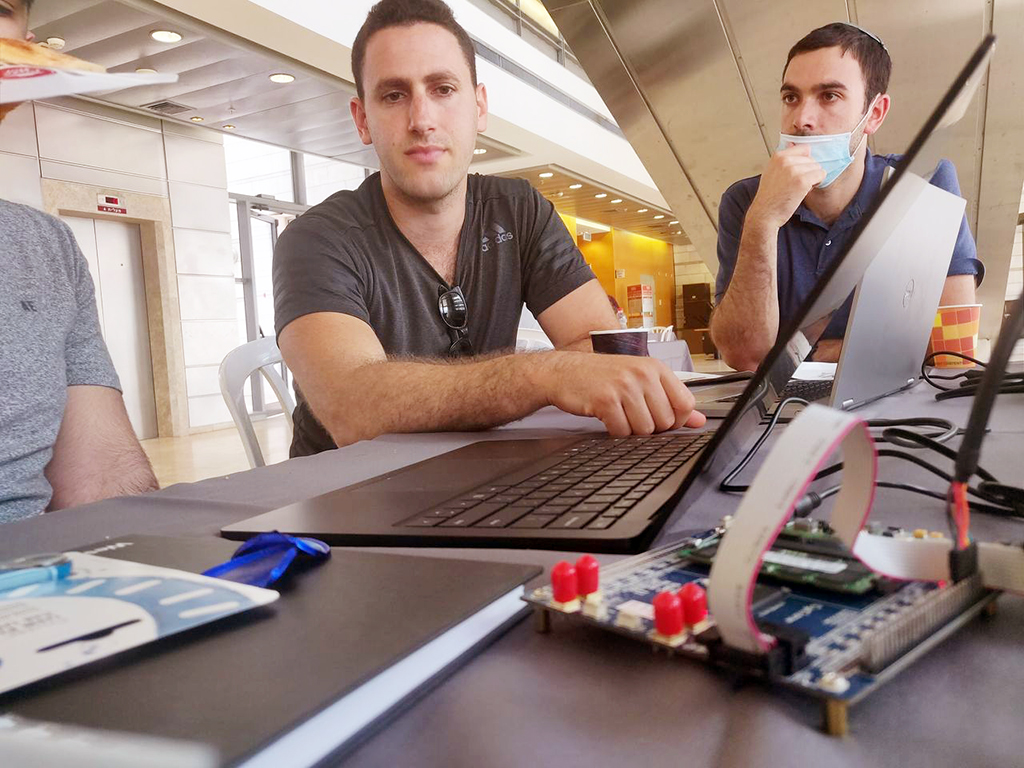The final project of the Digital Design Principles (DDP) course was constructed and presented at the hackathon held at the Faculty lobby

When it comes to a constantly innovating faculty, even a final project comes with a twist. The final project for the Digital Design Principles (DDP) course reached its apex in a Hackathon held on the last day of June, at the faculty lobby. “We were inspired by a Hackathon we participated in several months prior, in December 2019, focusing on RISC-V and sponsored by Western Digital,” says Dr. Adam Teman, the course’s academic supervisor. “Most participating groups in that Hackathon, winners included, used the PulpEnIX platform developed in Bar-Ilan; a group of BSc students from Bar-Ilan won third place. It was a fun, successful event. People prepared for weeks, slept on the floor – not because someone made them, but because they enjoyed it. We saw how excited people were, and to add some spice to our course (which explored similar issues), we decided to hold an end-of-course Hackathon.”
זו השנה הראשונה בה הועבר בפקולטה הקורס, שנהגה במרכז אימפקט, במעבדות אניקס בפקולטה להנדסה, אליו משתייכת קבוצת המחקר של ד"ר תימן. תימן מתמחה בתכנון שבבים, ובמהלך השנה החולפת זכה בפרס קריל ובפרס הרקטור לחדשנות מדעית, והוכתר ע"י האוניברסיטה כמרצה מצטיין. את הקורס שנבנה תחת אחריותו העביר יונתן שושן, שמוביל את צוות תכנון השבבים במעבדות אניקס, ובמקביל עושה דוקטורט בנושא של בקר למחשוב קוונטי. שותף נוסף לבניית הקורס הוא אודי קרא – מהנדס בעל ניסיון של כמעט 40 שנה בתעשיית השבבים, אשר הוביל את הפיתוח של פלטפורמת PulpEnIX ואת המעבד הישראלי "HAMSA-DI", ובמקביל מסיים תואר שני בנושא חומרה לבינה מלאכותית.
הקורס כלל מעבדה, בה מממשים דברים דיגיטליים בשפת System Verilog, וד"ר תימן, ביחד עם שושן וקרא, חיפשו איך לאתגר את הסטודנטים. "הגישה שלי היא לחפש דברים לגרום להוראה להיות יותר מעניינת," מסביר תימן. כך נולד הרעיון להאקתון. "התחלנו לשחק עם הרעיון הזה: הודענו לסטודנטים, חילקנו אותם לקבוצות של ארבעה חברי צוות, נתנו להם את הנושא ונרשמה התלהבות גדולה - ואז התפרצה הקורונה, ונאלצנו לגנוז את הכל. אבל כשהמצב התחיל להשתפר, בתחילת חודש יוני, הוצאנו את הרעיון מהבוידעם וקיבלנו אישור ממנכ"ל האוניברסיטה לקיים אותו, בהתאם להנחיות התו הסגול. במקביל, פנינו לחברות מתעשיית השבבים, הצענו להם לשלוח נציגים שימשו כחבר השופטים של התחרות - ונענינו בהתלהבות גדולה. שמחנו עוד יותר, כשחברת ווסטרן דיגיטל, אחת התומכות הגדולות בארכיטקטורת RISC-V, לקחה חסות על האירוע."
ההאקתון הוא השלב האחרון בפרויקט הגמר של הקורס - בנייה של מאיץ שמבצע פונקציה מורכבת – ונערך לאחר שלושה שבועות של עבודה מאומצת של הסטודנטים. באירוע עצמו, שהועבר כולו בלייב בפייסבוק של הפקולטה, עמלו הצוותים באופן מרוכז במטרה לשפר את המאיץ, לפתור תקלות של הרגע האחרון ולסיים את בנייתו. צוות ההוראה הסתובב בין הסטודנטים לאורך היום כולו ועזר לפתור בעיות. גם במקרה של משתתפים שלקחו חלק באירוע באופן מקוון - בשל החשש המובן מהגעה פיזית לאוניברסיטה, לאור הקורונה – העבודה מול הצוות התנהלה בצורה אופטימלית. כשהתקרב האירוע לקראת סיום, הכין כל צוות מצגת קצרה, בה הסבירו חברי הצוות מה הם עשו, איך, ולאיזה תוצאה הגיעו. בשעה 16:00 התאספו המשתתפים באולם ההרצאות להצגת הפרויקטים. פאנל שופטים מהחברות ווסטרן דיגיטל, מארוול, מלנוקס וקיידנס – חלק מחבריו נכחו פיזית באולם וחלקם לקחו חלק דרך אפליקציית זום – בחר בצוות הזוכה פה אחד. חברת ווסטרן דיגיטל, נותנת החסות האירוע, העניקה פרס גדול לצוות המנצח, ומתנת השתתפות לחברי שאר הצוותים. "בסיכומו של יום, ולמרות המצב המאתגר - כולם הסכימו שהיה אירוע מהנה, מלמד ומוצלח מאוד," מסכם ד"ר תימן.
Last Updated Date : 07/07/2020



